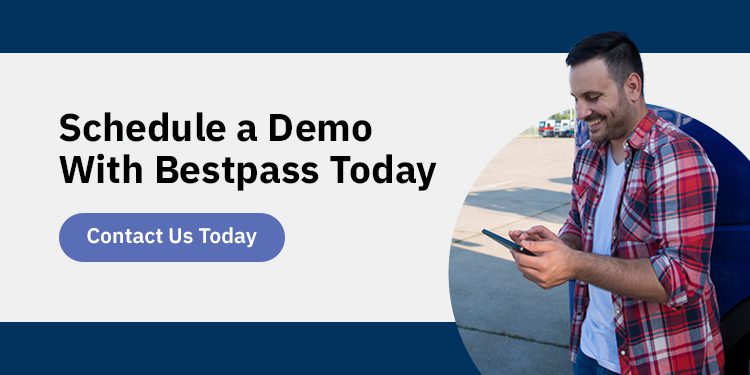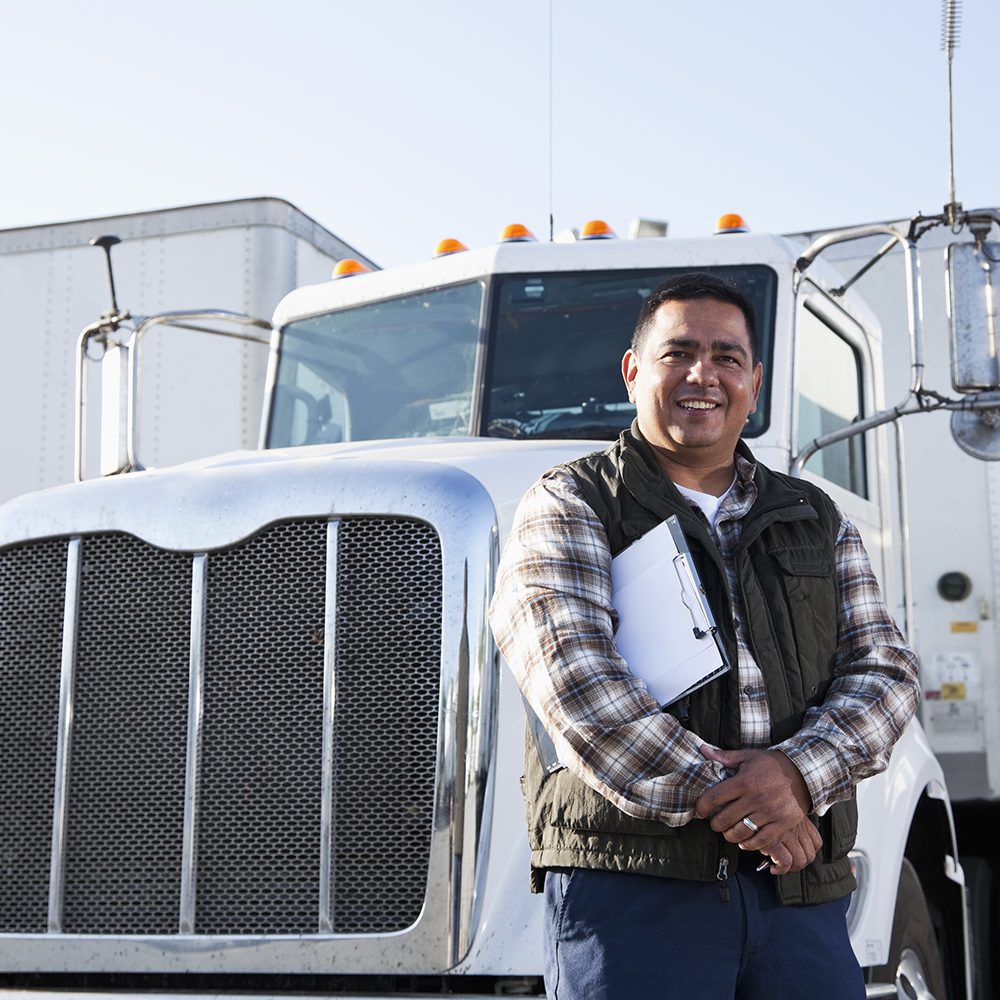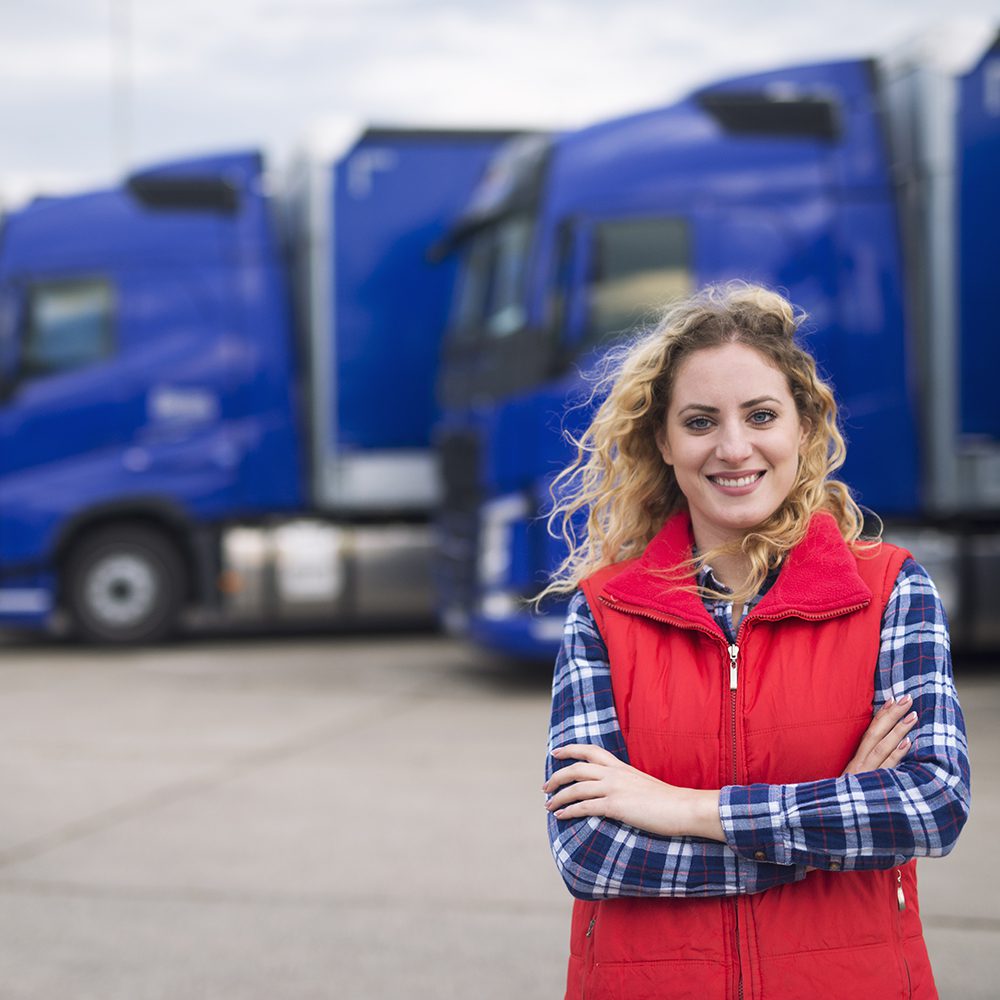
What Is an Owner-Operator Truck Driver?
There are many options for entering the trucking industry. For example, you can apply for positions within large trucking fleets after gaining driving experience and obtaining your commercial driver’s license.
Becoming an owner-operator is another way to join the trucking industry. Being an owner-operator means that a professional runs their own trucking business and manages all aspects of daily operations. They’re self-employed, meaning they set their preferred hours and choose their workloads. Learning more about owner-operators can help you decide whether you want to follow this pathway to start your career in the field.
Owner-operator Job Description
An owner-operator is a self-employed small business owner. They manage all daily operations for their company and are responsible for all typical trucking business duties.
- Purchasing vehicle insurance: Owner-operators must buy and maintain a vehicle insurance policy for their company. Operators must apply for various insurance types, including liability, property damage, physical damage or motor truck cargo. They must also pay all insurance expenses and maintain safe driving habits to keep rates low.
- Meeting compliance standards: Commercial trucks must meet compliance standards from the Federal Motor Carrier Safety Administration, Environmental Protection Agency and other regulatory bodies. For instance, you must obtain specific identifier numbers and keep your pollution emissions to a certain level. Owner-operators are responsible for meeting these standards and compiling the necessary data to prove compliance.
- Coordinating truckloads: Owner-operators organize and complete truckloads according to their workloads and schedules. They typically work with multiple clients and balance their schedules to accommodate different needs.
- Collaborating with other truck fleets: Some owner-operators also collaborate with larger truck fleets as independent contractors and accept work that aligns with their schedule or needs. This arrangement helps owner-operators find steady work while receiving majority pay. Owner-operators who use this option must balance their other responsibilities with their independent contractor work.
Many drivers prefer the owner-operator role because it gives them more independence and control over their work. Setting personalized hours and accepting certain workloads can boost your work-life balance and job satisfaction.
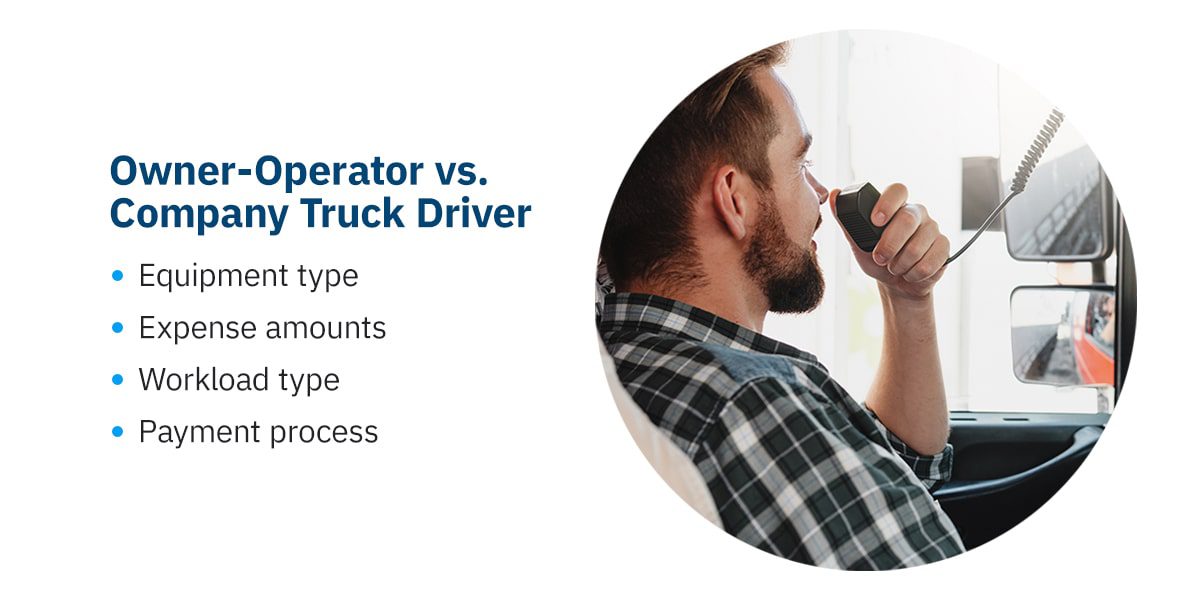
Owner-Operator vs. Company Truck Driver
Looking more closely at the differences between owner-operators and company truck drivers can help you determine which position fits you better. These are a few of the most significant variations between the two roles.
- Equipment type: The two positions have different responsibilities for using and managing truck equipment. Company truck drivers use company-owned trucks, which minimizes some of their responsibilities. The business handles all maintenance and related expenses for the trucks. In contrast, owner-operators purchase or lease the trucks they use while working. They must manage the overhead and maintenance expenses for the trucks. In addition, owner-operators have to define and follow maintenance schedules to ensure the vehicles remain fully operational.
- Expense amounts: The roles also have varying expenses. Overall, owner-operators face more costs. They must manage the initial startup business fees, such as purchasing equipment and obtaining permits. Owner-operator truck drivers also cover costs for maintenance, repairs, fuel, toll fees, insurance and other crucial aspects of vehicle management. Company truck drivers are not responsible for vehicle fuel, insurance or repair costs, making their annual expenses more manageable.
- Workload type: Workloads between the two positions also vary. Supervisors assign company drivers jobs. Drivers pick up and deliver loads according to their assigned work schedule, then take a designated break before the next project. Owner-operators have more control over their work — they find jobs through individual clients or with other approaches. In addition to driving responsibilities, owner-operators are also in charge of business responsibilities, like record-keeping and financial management.
- Payment process: Company truck drivers usually get paid based on the number of miles they drive. The exact rate depends on the employer and cargo type. Company drivers might also earn bonuses or overtime for additional work. Owner-operators use contracts to define their job obligations and payment requirements. The contracts outline the job length and specify the monetary amount they receive once they complete the workload. Owner-operators often negotiate pay with clients to find the range that suits them.
How Much Does an Owner-Operator Truck Driver Make?
How much do owner operators make? Based on data from 2023, an owner-operator earns, on average, around $20,000 per month. However, there is significant variation in income based on location and situation.
Salaries can vary depending on contract rates. Unlike contracted drivers, as an owner-operator you can specify your contract rates. You might earn more if you charge a higher flat rate or service rate in your contract. When calculating a salary estimate, you must consider deductibles like tolling fees, taxes, maintenance and overheads. Higher deductibles can mean a lower net amount.
An owner-operator truck driver can earn on average of $4,700 a week and $120 an hour. Weekly wages can range between $600 to $7,000. Factors that influence an owner-operator truck drivers’ salary include:
- Business considerations: Like with any industry, there is variation in salaries across the board. Truck driver’s salaries depend on type and size of the company they work for, the industry and their position.
- Location: Wages also depend on the industry average of the state or city — operating within a state that has a higher industry average wage often corresponds to higher salaries for owner-operator truck drivers.
- Milage: Your wage can also depend on mileage rates. Most truck companies pay drivers based on the miles they travel per month.
- Experience: Owner-operator salaries will also depend greatly on experience and level or position in a company.
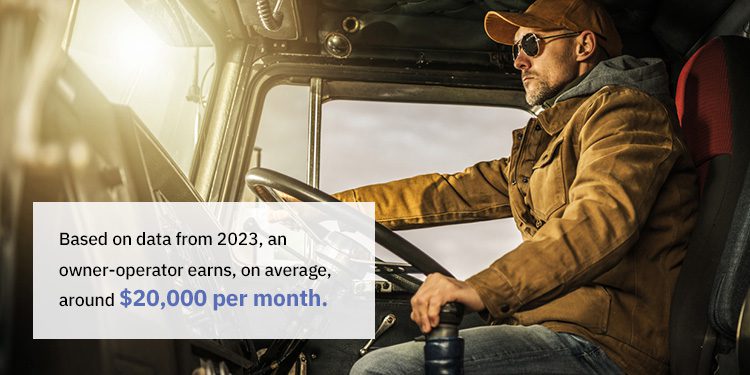
How Do Owner-Operators Get Paid?
Owner-operators can earn payment in various ways and can select the most convenient option for their needs. The most common payment methods include load percentage and mileage rate.
Load Flat Rate
This payment method works on the amount of loads you deliver. You can select to transport loads for various companies and get a flat rate or percentage of the load revenue. You can set out a flat load rate in your contract. For example, if you stipulate a 50% or 100% flat rate in your contract, you’ll receive 50% or 100% of profits for each load. You can earn a high wage with this model, especially if you’re hauling high-value loads consistently. The only drawback is that you might only get a high-paying load sometimes, providing inconsistent or differing monthly salary amounts.
Mileage
Do you know that truck drivers drove an average of 327.48 billion miles in 2021? That’s why the millage rate is one of the most popular payment models for truck companies and independent owner-operators. You earn payment based on the miles you drive. You can stipulate a set mileage rate, like $2.00 per mile, and use that figure for each load you transport.
For example, if your contract specifies $1.80 per mile and you do 50 miles per load. You’ll multiply $1.80 by 50 to get your fee or wage of $90. This model is popular because it is direct and quick to calculate. It also means you earn based on your mileage rate regardless of the load value. The more miles you do, the more you make.
What Do You Need to Become an Owner-Operator?
Becoming an owner-operator means taking control of your schedule and job types. It also requires more preparation and actions than a company truck driver. These are some of the requirements to build a career as an owner-operator.
- Stable finances: Becoming an owner-operator requires several investments. You must purchase or lease a truck to complete jobs, which might be out of your budget range. You also must manage other business startup costs and ongoing overhead expenses. It’s best to assess your finances before moving forward with these costs. If necessary, you can save additional money before beginning the process. Having an emergency fund also helps you navigate difficulties if they occur later.
- Commercial driver’s license: If you don’t already have a CDL, you must obtain one to become an owner-operator. This process follows steps from the FMCSA, which include getting a commercial learner’s permit, completing entry-level driving training and passing a test to officially receive the license. You can use your state’s CDL manual to learn the essential driving techniques and safety protocols. Many owner-operators start as company truck drivers before changing careers, obtaining their CDL during this process.
- An established business: You also need to start a business. The FMCSA needs proof of your operations before assigning you identifying information like a USDOT number. Create a business name, outline your objectives and build a growth plan for the next five or 10 years. These preparatory steps help you identify your goals, which helps with funding and management later. Then, register your business to make it official. Many owner-operators use the U.S. Small Business Administration website to complete this process.
- USDOT number: After launching your business, you can apply for a United States Department of Transportation number. This unique identifier helps the FMCSA monitor interstate commerce and vehicle behaviors. Companies operating commercial vehicles and participating in interstate commerce must acquire a USDOT number, or face significant penalties. To receive a USDOT number, follow the FMCSA’s registration instructions.
- Truck insurance: The FMCSA also requires owner-operators to acquire vehicle liability insurance coverage. Owner-operators can select other insurance types that suit their preferences, like personal property coverage or roadside assistance. You can explore rates with various companies and find the best plans for you.
Schedule a Demo With Bestpass Today
Owner-operators have more independence and control over their workloads, creating a more satisfying position. They also have to manage many daily business operations. Owner-operators can stay organized with tools like Bestpass toll management solutions. We’ve tailored our owner-operator solution to meet this position’s unique responsibilities. The software streamlines toll payments, helping you save money and increase efficiency.
To learn more about Bestpass toll payment solutions, sign up today.
Speak With A Tolling Specialist Now
What we offer is a way for service fleets, trucking companies and owner-operators to simplify their toll payments and get discounts on tolling. We provide violation dispute management services and allow your company to pay for your toll costs in one convenient place.
